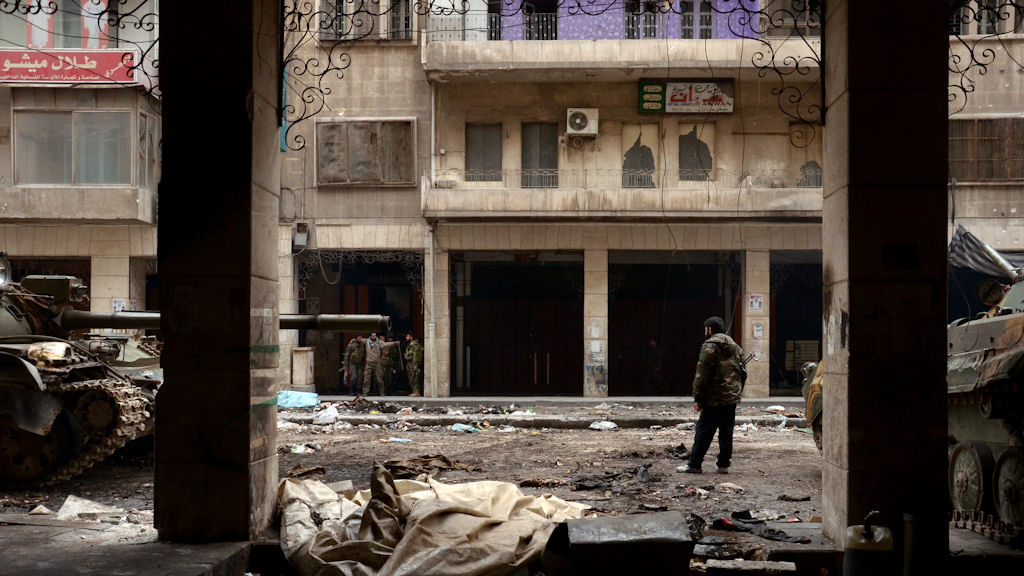US promises aid for Syria rebels – but is it too late?
US Secretary of State John Kerry pledges $60m to support the opposition in Syria in the face of government “brutality”, but stops short of any form of military intervention.
Speaking at a meeting in Rome between Syria‘s main opposition and its western and Arab backers, US Secretary of State John Kerry said: “The US decision to take further steps is a result of the continued brutality of a superior military force propped up by Iran and Hezbollah.
“The Syrian opposition coalition can successfully lead the way to a peaceful transition but cannot do it alone.”
The United States has pledged a further $60m of aid for the Syrian opposition but Mr Kerry stressed that it was “non-lethal” aid, and would instead help the opposition to support citizens, expanding the delivery of essential goods and services, as well as with administrative functions such as security and sanitation.
Mr Kerry announced the support after meetings with the head of the Syrian national opposition coalition leader, Moaz al-Khatib. He said the US would also work with Syria’s Supreme Military Council to provide support to the Free Syrian Army, including food and medical supplies, as well as continuing to provide aid to try to deal with Syria’s spiralling refugee crisis.
Speaking in Rome, a Syrian opposition spokesman told Channel 4 News foreign affairs correspondent Jonathan Rugman that the rebels were seeking a small number of sophisticated weapons from the West. Such weapons would have GPS devices fitted and their serial numbers would be tracked in order to keep them out of the hands of jihadists, the spokesman said.
Syrian opposition spokesman: there is plan for any western weapons to have their serial numbers tracked, GPS fitted, kept from jihadists.
— Jonathan Rugman (@jrug) February 28, 2013
Before the meeting, a US official told CNN the intervention aimed to prevent extremists from filling the gaps in Syria.
The Syrian opposition coalition can successfully lead the way to a peaceful transition but cannot do it alone. US Secretary of State John Kerry
“If the Syrian opposition coalition can’t touch, improve and heal the lives of Syrians in those places that have been freed, then extremists will step in and do it,” the official said.
The $60m is in addition to $50m already provided by the US to the opposition coalition, but it is thought to be the first time the US has provided aid directly to rebel fighters.

While Mr Kerry’s pledge marks a policy shift for America, many have argued it – and the west more generally – could do more, particularly in the wake of increasingly intense attacks in recent days including the use of Scud missiles to kill civilians.
The UN estimates that 70,000 people have died in the Syrian conflict, which began two years ago with protests against the regime of President Bashar al-Assad. More than 40,000 people are fleeing the country every week.
David Butter, associate fellow at Chatham House, said the change in the US position was linked to two things – firstly, the real deterioration in the humanitarian situation in Syria, and secondly, the risk of the rise of extremist groups which risks creating long-term global problems. But he said there are concerns that the intervention has come too late.
“Is it too late to turn things round? In a sense it is too late in terms of the damage in perception from the Syrian opposition to the west,” he told Channel 4 News.
“There’s a feeling that they were encouraged to take on Assad and then when things got tough, the west didn’t step forward.”
However he said the conflict had changed in recent weeks, making it more difficult for the international community to stand by.
Syrian civilians suffer scud missile attacks - see the Channel 4 News report
“There has been a very blatant escalation from the regime and again this raises the issue of the responsibility to protect from the outside when we’ve got civilians being hit by this type of weaponry,” he said.
“It would be hard [for the west] to rebuild any sort of trust but I think the situation in Syria, at some point when the conflict winds down – maybe in years – there is going to have to be a huge international aid effort to get it back on its feet because the country doesn’t really have the financial resources on its own.”
-
Latest news
-
Taylor Swift’s new break-up album breaks records3m

-
NHS trust fined £200K for failings that led to death of two mental health patients3m

-
Sunak vows to end UK ‘sick note culture’ with benefit reform3m

-
‘Loose talk about using nuclear weapons is irresponsible and unacceptable’, says head of UN’s nuclear watchdog3m

-
‘There wasn’t an Israeli attack on Iran,’ says former adviser to Iran’s nuclear negotiations team7m

-




